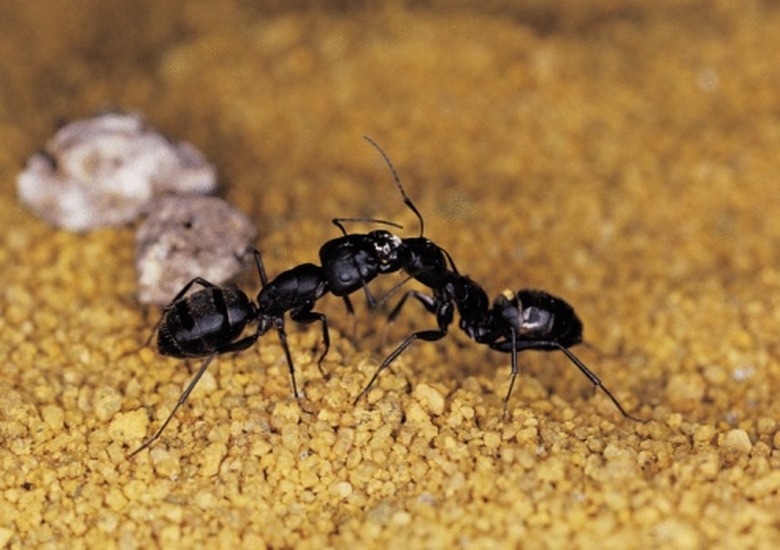Why Black Ants Come Into New Houses
While it's impossible to prevent ants from ever entering your home, there are steps you can take to reduce the likelihood of encountering these unwanted house guests. Like all living creatures, ants need access to food, water, and certain other amenities in order to survive. If your house provides what they need, ants will move in and make themselves at home. Fortunately, once you know what attracts ants, you can take steps to make your home less desirable.
Food
Ants are hungry little critters, and they like many of the same foods that humans eat. Sugars, meats and starches all will attract ants, and it takes only a small amount of food to do it. To avoid ants, you need to be vigilant in the kitchen and anywhere else food is found in your home. Store foods in the refrigerator, freezer, or in airtight containers, and keep some of the foods ants won't eat tucked around. Thoroughly wipe down counters and tables after eating or preparing a meal and empty your kitchen trash can frequently. Never leave dirty dishes in the sink overnight, clean your dishwasher often, and vacuum the kitchen thoroughly every day. Food scraps that fall behind the stove or get kicked under the refrigerator are all it takes to invite ants in, so remember to clean those places. Always rinse recyclables.
Water
Water is as necessary to ants as food. Leaky plumbing, damp basements, and full gutters all grant ants access to a steady supply of the water they need. Your home will become much less attractive to ants if you fix leaky pipes, waterproof your basement, and make sure your gutters and downspouts are in good working order. Make sure your downspouts are directing water well away from your home and that the area around them is draining properly rather than creating puddles. Check your yard for water sources, too. Kiddie pools, empty buckets, and children's toys can all collect rainwater and make water fountains for ants.
Nesting Materials
Although every ant needs a place to call home, carpenter ants are the most likely to invade yours in search of nesting materials. Carpenter ants bore holes into wood and then lay eggs inside the resulting tunnel. If ants bore too many tunnels into the wood, it can lose its structural integrity and cause problems. To avoid carpenter ants, make sure any wood decks or framing in your home sit on concrete rather than directly on the ground. Paint or finish wooden surfaces to make them less attractive to ants. Check your yard for problem areas, as well as your house. Carpenter ants love rotting wood and often create satellite colonies in addition to their primary nest. This means that any rotting trees, old firewood, or wooden structures within 100 yards of your home could be harboring ants. Find outdoor nests whenever you can and treat them with an insecticide to stop ants before they make it into your home.
Warning
If you opt to treat a found ant colony, always carefully follow the directions on your chosen pesticide. Pesticide is poisonous, so verify that children and pets won't have access to the treated area.
Prevention Tips
Removing the things that attract ants is the first step in prevention, but there are several other ways to keep ants out of your home. One is to cut away any tree limbs or plants that are touching your house. These plants act as a bridge for ants, making it easy for them to walk right into your home. Keep mulch and plants at least two feet away from your home's foundation. Take a walk around your home, looking for cracks and sealing any you find with caulk. Be particularly mindful of areas where electricity and water enter your home, as there are often openings around these lines that let ants in. Seal cracks around windows and doors as well.
